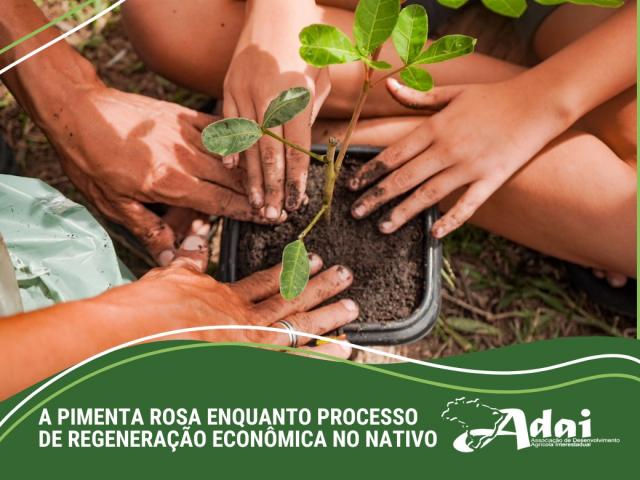Pimenta Rosa as a process of economic regeneration in Nativo

“Aroeira is a good and healing remedy”
In Nativo, a community located in Barra Nova, on the coast of São Mateus, the harvesting of Pimenta Rosa or Aroeira has been an economic alternative for traditional fishing and shellfish gathering communities affected by the collapse of the Fundão dam. The municipality is a reference in production in Espírito Santo and also in Brazil. And to strengthen the community actions of small local producers, the second edition of the Pink Pepper Festival was held between June 23 and 25. The event is an initiative of the Capixaba Institute for Research, Technical Assistance and Rural Extension (Instituto Capixaba de Pesquisa, Assistência Técnica e Extensão Rural – Incaper), the Espírito Santo Association of Aroeira Producers and Extractivists (Nativa), São Mateus City Hall and the Espírito Santo Department of Agriculture, Aquaculture and Fisheries.
For Reginaldo Castro, President of the Association of Aroeira Producers and Extractivists of Espírito Santo, the meeting is an opportunity to learn about aroeira cultivation. “Here at this festival you arrive as a layperson and you leave informed, you leave planting aroeira and working with quality, because the association has existed since 2011 with the aim of bringing producers together, adding value to their product and bringing knowledge to those who don’t know about it.” He said.
This is because the event included lectures on the aroeira and pink pepper production chain, debates, workshops, guided tours, product tastings, typical dishes and recreational and cultural activities.
Incentives
Incaper has been investing in the area since 2008. According to Fabiana Ruas, Biologist and Natural Resources Coordinator at the Institute, the work in the community goes beyond the laboratories. “We started research, not only research, but also technical assistance and rural extension, with these communities, with this population, both rural producers and extractivists. And we started studying, researching pink pepper, how it is planted, what fertilizer is used, whether it is organic, other types of fertilizer, what products can be used, how to get a final product, whether it is the fruit, the pink pepper, or products with added values.” Said.
And today, the product that has traditionally been used in people’s daily lives, as a medicine and in cooking, is produced and marketed in the form of essential oil, ointment, repellent, soap, and various other care products and also surprises by adding aroma and flavor to cheeses, gastronomic dishes and even beer.
Technical Assistance to the Affected Parties present
The technical advisory services of those affected were at the event to contribute to and strengthen the restructuring of production chains, which have traditionally always been developed and are now a socio-economic alternative for affected communities, given that to this day the damage persists and has not been repaired by the companies responsible for the disaster. There was an Adai stand, where people could ask questions and offer information. There was a Health Tent, promoted by the Health and Social Services and Mobilization teams, and a circus to attend to the children who were there.
“We know that this festival is very important, because it seeks to highlight how pink pepper has become a source of income, including for those affected communities that have lost their activities as a result of the dam collapse. So we are contributing to this task by being present for these three days. An event that has various programs, actions, including various courses, various lectures.” Janaína Mattos, Adai’s technical advisor, said.
Facts that matter and motivate the fight
Among the presentations, the highlight was the lecture “Economic Indicators of Aroeira and Pink Pepper Production in Espírito Santo”, given by Camilla dos Santos Nogueira, PhD in Social Policy, who is responsible for coordinating the project. research project by the Federal University of Espírito Santo (UFES) “Regional development and economic sustainability alternatives for traditional fishing and shellfish gathering communities affected by the disaster caused by the collapse of the Fundão-MG dam, Samarco company, in the municipality of Mariana-MG: the case of aroeira production in the coastal area of São Mateus”, approved in the FAPES/CNPq 11/2019 notice, of the Regional Scientific and Technological Development Program, executed by the Centro Universitário Norte do Espírito Santo (CEUNES) in partnership with the Federal Institute of Education, Science and Technology of Espírito Santo (IFES) São Mateus in the research project “Strengthening community actions of small producers of Pimenta-Rosa in the District of Nativo in São Mateus – ES”.
Developed to systematize the economic demands of the communities affected by the Samarco disaster, and the construction of solutions for generating work and income, as well as the identification of the links in the aroeira/pink pepper chain in São Mateus, and their challenges and potential, fulfilling the overall objective of the project.
Of the 150 families interviewed:
• 97.3% affected by the Samarco disaster;
• 78% are artisanal fisherwomen;
• 74% have fishing as their main family income;
• 86% are prevented from fishing due to contamination of the sea and river;
• 44.6% are prevented from crabbing due to contamination of the sea and river;
• 72% harvest pink pepper;
• 58% sell pink pepper in natura;
• 59.3% say that the production of mastic and pink pepper is an economic alternative after the Samarco disaster.
The importance of the aroeira tree in the communities affected by the collapse of the Fundão dam has been proven, both from the point of view of popular and community care and health, and in regenerating the income of these families. However, it is necessary to increase the value added to the mastic produced and harvested in these locations, since most of the production is marketed as a basic primary product (commodities). Given the importance of this native plant in regenerating the income of these communities, investments via renegotiation can guarantee fair reparations.
Communications team – Adai
Espírito Santo

